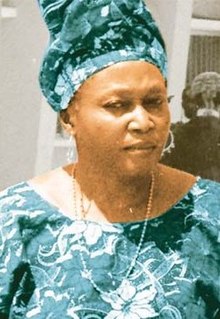Kudirat Abiola
 From Wikipedia - Reading time: 6 min
From Wikipedia - Reading time: 6 min
Kudirat Abiola | |
|---|---|
 Abiola in 1994 | |
| Born | Kudirat Olayinka Adeyemi[1] 1951 Zaria, Nigeria |
| Died | 4 June 1996 (aged 44–45) Lagos, Nigeria |
| Cause of death | Assassination by firearm |
| Spouse | Moshood Abiola |
| Children | 7 (including Hafsat Abiola) |
Alhaja Kudirat Abiola (born Kudirat Olayinka Adeyemi), popularly known simply as Kudirat Abiola[1] (1951 – 4 June 1996), was a Nigerian pro-democracy campaigner. She was assassinated whilst her husband, Moshood Abiola, was being detained by the Nigerian Government. He was the winning candidate in elections that had taken place in Nigeria in 1993 and was arrested shortly after they were summarily annulled by the ruling junta.
Life
[edit]Kudirat Olayinka Adeyemi was born in 1951 in Zaria in Nigeria. Alhaja Kudirat Abiola was the second woman to have married her husband. At the time of her death, she was his senior wife.[2]
Death
[edit]Abiola was assassinated while her husband was being detained by the Nigerian Government.[3] Her husband was believed to have been the winning candidate in the Nigerian elections that had taken place in 1993, and he was arrested shortly after they were annulled by the government of the dictator Ibrahim Babangida. The killing was the subject of an investigation and trial many years later. According to accounts, the murder was ordered and then carried out by six men. Kudirat Abiola died in her car from machine gun fire. Her driver also died. Her personal assistant, who was later accused of being involved with her assassins, was in the car but was not hurt.[2]
Aftermath
[edit]Her husband continued to be detained without charge after her death. He died in suspicious circumstances just before it was said that he was to be released on 7 July 1998.[3]
Legacy
[edit]At the time of her death an anti-military rule "Radio Democracy" had just been created and it was based in Norway. It was backed by the American, British, Swedish, Danish and Norwegian governments to help end military dictatorship in Nigeria. The Radio station's name was changed to Radio Kudirat.[4]
In 1998 a street corner in New York was renamed Kudirat Abiola Corner, despite protests by the Nigerian Government.[5]
In October 1998 Major Hamza Al-Mustapha appeared in court with the previous President Abacha's son Mohammed, charged with the murder of Kudirat Abiola.[6] At the trial the self-confessed killer, Sergeant Barnabas Jabila, said he was obeying orders from his superior, Hamza Al-Mustapha.[7]
On 30 June 2012 Hamza Al-Mustapha and Alhaji Lateef Shofolahan were sentenced to be hanged for the murder of Alhaja Kudirat Abiola. Al Mustapha had been a Presidential Chief security officer whilst Shofolahan had been his victim's personal assistant. The two were later released on appeal by a court in Lagos.[8]
Abiola remains a symbol of Nigeria's struggle for democracy. Nineteen years after her death there were demonstrations at her graveside. A documentary, "The Supreme Price" details the story of how both Abiola and her husband paid a terrible cost in their quest for a better, freer Nigeria. It was directed by Joanna Lipper, a lecturer at Harvard University, who tells the story from her daughter, Hafsat's perspective. The documentary also includes interviews with Walter Carrington, former U.S. ambassador to Nigeria, and Nobel Prize-winning writer Wole Soyinka.[9]
References
[edit]- ^ a b Adigun A. B. Agbaje; Larry Jay Diamond; Ebere Onwudiwe; Oyeleye Oyediran (2004). Nigeria's Struggle for Democracy and Good Governance: A Festschrift for Oyeleye Oyediran. Ibadan University Press (University of Michigan). p. 305. ISBN 978-9-781-2140-04.
- ^ a b The Brutal Assassination of Kudirat Abiola: Here Is The Complete Story, 20 January 2016, Daily Mail (Nigeria), Retrieved 7 February 2016
- ^ a b Moshood K.O. Abiola: From Wealth to Troubled Politics to Flawed Symbol, Michael T. Kaufman, New York Times, July 8, 1998
- ^ MOMODU, DELE. "MEMORY LANE: The Drama of Abiola's Death (3)". BAYO ADEYINKA BLOG. Bayo Adeyinka. Archived from the original on 8 June 2014. Retrieved 8 February 2016.
- ^ "METRO NEWS BRIEFS: NEW YORK; Street Corner Named For Nigerian Dissident". The New York Times. Associated Press. 1998-01-25. ISSN 0362-4331. Retrieved 2019-03-21.
- ^ Human rights watch world report, 2000. Human Rights Watch. 1999. p. 58. ISBN 1-56432-238-6.
- ^ Olayiwola Abegunrin (2003). Nigerian foreign policy under military rule, 1966-1999. Greenwood Publishing Group. p. 156. ISBN 0-275-97881-8.
- ^ Kudirat Abiola’s murder: Appeal Court frees Mustapha, Shofolahan, Bartholomew Madokwe, 13 July 2013, VanguardNGR, Retrieved 8 February 2016
- ^ "Review: 'Supreme Price' tallies the cost of seeking change in Nigeria". Los Angeles Times. 2014-10-03. Retrieved 2021-06-14.
 KSF
KSF